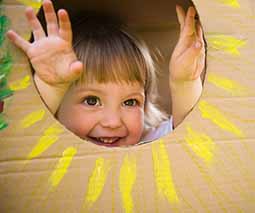All the curious, curly questions: Why do kids need to know everything?

If you have a small child in your life, chances are that you’ve been on the receiving end of a multitude of questions, some as simple as “but why?” and others that stray into much more complex territory.
All the curious, curly questions
The jury is still out on exactly how many questions kids ask each day. One study put the figure at 73 questions a day, while another reportedly asserted it’s actually more like 76 questions PER HOUR. Gasp.
It’s no wonder parents sometimes find themselves tuning out to their little scholars, but is learning stuff truly what this is all about?
The experts say … YES! They’ve found that kids usually ask questions not to get chatty or seek attention, but because they are seeking answers.
Top of the pops is knowing what things are for and/or why things are happening – and it turns out they’re pretty much programmed to question everything.
Read more about preschoolers:
- Why do kids love garbage trucks so much?
- New study suggests childcare centres might be best for kids’ development
- Why do kids love dinosaurs so much?
The mini mindset
Writing about curious kids for The Cut, Drake Baer put these curly q’s down to something called teleological thinking which he explained: “guides the profoundly human compulsion to ask questions.”
Teleological thinking assumes that an object or behaviour exists for a particular purpose – and anyone with a preschool-aged child will have been on the receiving end of this sort of assumption.
“What’s this for?” or “What does this do?” or “Why is this doing that?” are indicators of this mindset in wee kids.

This is for that thinking
Kids seem to declare open season on this sort of research from a very early age, and often don’t discriminate between objects (or individuals!) thanks to their teleological leanings.
One study found that kids assigned functions to all kinds of objects, deciding that “tigers are for walking around and going in the zoo” or “mountains and their peaks are for climbing”. Another confirmed that preschool children differed from grown-ups” by asserting that entities of all kinds—clocks, feet, lions, and icebergs—were “made for something”.”
Kids are so primed to seek out purpose in objects, they will attempt to fill in the gaps themselves – often inaccurately. This leads to what Dr Deborah Kelemen, a psychologist at Boston University (who’s done a tonne of research on teleological thinking in children and adults) calls promiscuous teleology.
“Rocks are jagged so animals can scratch themselves” and “birds exist to make nice music” are some examples of this sort of ‘promiscuous’ thinking in primary school-aged children. Dr Kelemen says finding answers to THINGS, however naive/erroneous those answers might be, continues until kids have a greater mastery of science (or are exposed to more advanced curriculum at school.)

What kinds of questions are kids asking?
A recent survey reported on by The Independent concluded that parents found lots of questions super-challenging to answer. Particularly pesky pearlers included things like:
Why do people die? Where did I come from? What is God? How was I made? What does “we can’t afford it” mean? Is Father Christmas real? Why do I have to go to school? When you die who will I live with? Why is the sky blue? Why can’t I stay up as late as you?
As parents ponder how much they don’t know, kids get excited about how much there is to know.
What should parents do if they’re stumped by a question their child asks?
As detailed above, kids really do want to find answers to their curly q’s, so if you don’t know the answer, be honest with your child.
Don’t stop there though, model great behaviour by doing some research and working to fill in their blank. You can show them how you look things up online, and talk them through the results you find. If the question is particularly tricky or sensitive and you need more time to find an answer, write it down and let your child know that you are going to find out and get back to them.
Also? Keep answers age-appropriate and as short and sweet as possible. Your child will let you know if they need to know more.
Respecting kids’ quest for knowledge is the best approach, and being clear about the fact that everyone is learning all the time – including you – helps bolster their confidence and create a brilliant environment for curiosity to flourish in.









